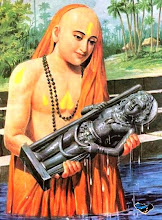Source: DharmaprakAsh publications, Chennai
1. What is the aim of Humanity?
The aim of humanity is happiness, uninterrupted by sorrow.
2.Is it possible to enjoy such uninterrupted happiness?
Yes. The vedas say it is possible.
3.What are the vedas?
Vedas are eternal scriptures of mankind.
4. Who wrote them?
Nobody wrote them. They eternally exist in the Supreme Lord's mind and He, it is that gives it to Lord Brahma at the beginning of each creation for the guidance of humanity.
5.What do u mean by eternal scriptures?
Eternal scriptures are those that exist in the self same order without a change due to time and space. Vedas are such Scriptures.
6.What are punya and pApa?
Vedas give a value called Dharma, for the guidance of humanity. If we observe this value in our conduct, we incur merit(Punya), if we violate it, we incur (pApa) sin.
7.How do punya and pApa influence our life?
Happiness is the result of punya and unhappiness is the result of pApa. Hence, is the call given to refrain from incurring pApa or demerit, if we wish to enjoy happiness uninterrupted by sorrow.
8.What is Dharma?
Dharma is the law of order in the Universe. Its correct estimate is possible only by a correct study of the Vedas and practise of the same in one's life.
9. Whay should I accept the value called Dharma?
Every person who accepts the value called Dharma, contributes to orderliness in the Universe and every person who violates it contributes chaos in the Universe. Hence a person who does not accept Dharma by implication, implies that theres disorder in the Universe.
10.Who is the judge?
The Lord is the judge.
11.Why is he partial to some and cruel to others?
The Lord is never partial to some and cruel to others. He receives each one as per the devotion practiced by that person.
12. What is his promise?
His promise is to uphold the good and contain the evil.
13. Why is there evil in the world?
Evil like good, is eternal. The Lord does not choose to destroy it. He controls it.
14. Is religion very difficult to practise?
No. It is the easiest thing to practise.
15.How?
Remember the Supreme Lord always in all your activities. Forget him never.
16. What of it?
The rest of the progress follows from his simplest rule.
plz giv me more details abt VEDAS..hw wee they created..I heard dat it came through the vibrations occuring in Vayu....plz clarify..
R vedas in text buk form?....
VEdAs arnt created by anybody..They are apaurushEya i.e without any author..that is why they r considered flawless..For more details pls go thro this link..it shud help u immensely ..
..
http://www.geocities.com/kadirik/articles/apaurusheyatva_of_vedas.html
R vedas in text buk form?....
VEdAs arnt created by anybody..They are apaurushEya i.e without any author..that is why they r considered flawless..For more details pls go thro this link..it shud help u immensely
 ..
..http://www.geocities.com/kadirik/articl

No comments:
Post a Comment